US companies fear minimum tax deal
A part of the planned global minimum tax agreement could limit the effectiveness of tax incentives for research, US businesses are warning.

The emerging global minimum tax agreement would make domestic tax breaks less valuable for some US-based companies, potentially limiting the effectiveness of incentives for research, exports and low-income housing, businesses are warning.
Their concerns stem from proposed international rules about how nations can use tax breaks to aid companies’ home-country operations, under the global deal that puts a 15 per cent floor under corporate tax rates.
To create a level playing field, the rules let other countries impose taxes if multinationals pay too little at home. US policymakers are still assessing any impact, but companies are starting to raise concerns.
“It’s a big deal,” said Mary Bennett of law firm Baker & McKenzie. “There are a number of companies that have been paying close attention.”
Under proposed rules, large companies could benefit from domestic tax breaks until their rates got down to 15 per cent. Below that threshold, other countries could impose what is known as a “top-up tax” on those companies and make up the difference.
The top-up tax is meant to help governments enforce the 15 per cent minimum tax backed by Treasury Secretary Janet Yellen and her counterparts from nearly 140 countries.
The rule was designed to make sure that China and other countries couldn’t skirt the minimum tax with domestic tax breaks for their home companies.
But that agreement could yield awkward or painful results for the US – where companies could lose the full benefit of US tax breaks, and revenue could go to France or Japan instead, business groups say.
The global deal’s potential impact on domestic US tax breaks has been drawing attention from US companies and policymakers since detailed rules were released in December. A business group whose members include Cisco, Bank of America and Texas Instruments sent a letter on Wednesday to Ms Yellen outlining concerns.
Officials are trying to understand which large companies might be affected and what, if anything, the US should do. The 15 per cent is measured in ways that differ from typical tax calculations, with some provisions that are corporate-friendly and some that aren’t.
The potential effect on credits wasn’t new, said Rose Jenkins, a senior attorney adviser at the New York University Tax Law Centre. If it was an actual concern, she said, there was time to address it before top-up taxes started in 2024.
“Policymakers should press for some more hard information,” she said. “It’s hard to make a decision in a vacuum.”
The focus on US domestic taxes is the latest twist in the long-running, complex global corporate-tax talks. Countries are trying to implement the 15 per cent global minimum tax, starting in 2023, and they are trying to resolve details in legislation while maintaining international momentum.
Under the plan, countries would impose a tax of at least 15 per cent on their home companies in each foreign country. For the US, that means ensuring Microsoft pays at least 15 per cent in Ireland, that Pfizer pays at least 15 per cent in the UK, and so on.
In the US, Democrats included minimum-tax implementation in President Joe Biden’s Build Back Better legislation, which stalled in congress. Many US companies and Republicans oppose the international tax provisions, but Democrats have been united enough to pass them – if they can figure out the rest of the bill. That Democratic unity has pushed companies and their lobbyists to seek delays and technical changes.
The global tax deal’s effect on US tax incentives has received relatively little attention so far.
Countries would split top-up tax revenue depending on the company’s employees and assets in each country.
The Wall Street Journal


